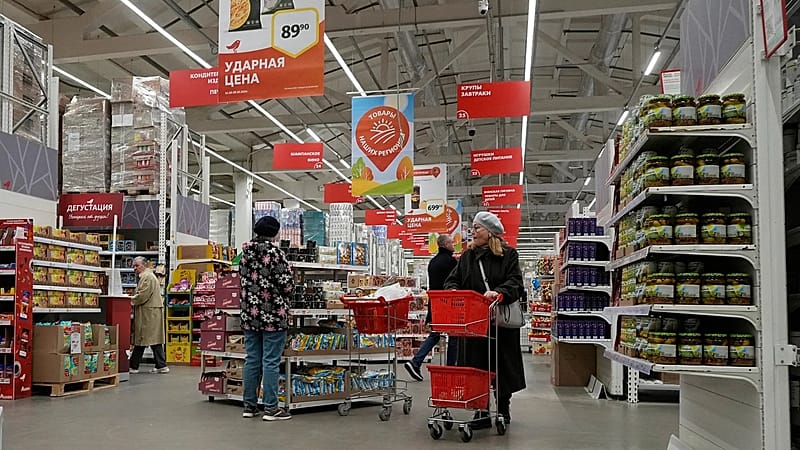
Almost four years since Russian President Vladimir Putin ordered the full-scale invasion of Ukraine, 23 French companies continue to operate in Russia.
That's just under a third of the 75 firms that were active in the country at the beginning of 2022, before the invasion in February that year.
Since then, many French corporate giants, such as Société Générale, LVMH and Safran, have withdrawn from the Russian market, either because of the difficulties of doing business in a heavily sanctioned country or because of the potential PR disaster if they had decided to stay.
But some of the companies that remain are major players — and business is booming.
Two French corporations are in the top 20 in terms of revenue in Russia in 2024, according to a recent report by B4Ukraine, a global coalition of civil society organisations.
DIY retailer Leroy Merlin ranked third with $6.8 billion (€5.9 billion) in revenue last year, while supermarket group Auchan was in eighth place with $3.3 billion (€2.9 billion).
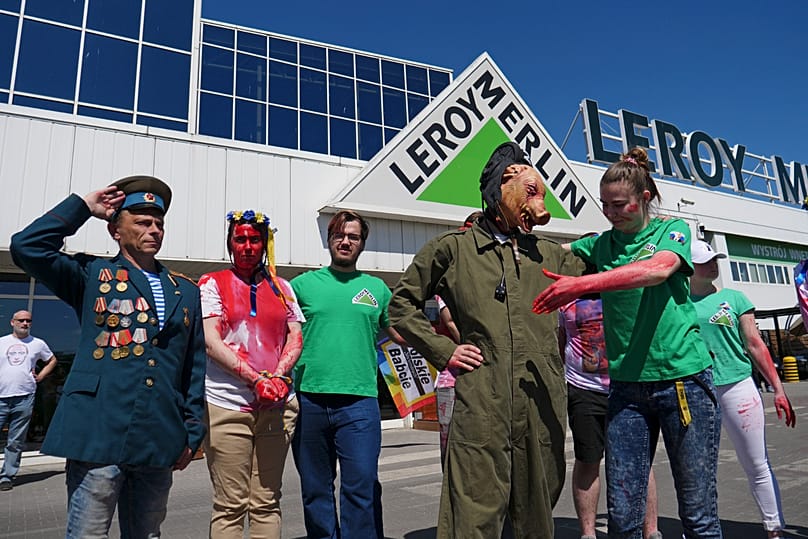
Meanwhile, in terms of profit tax paid to Moscow, Leroy Merlin came in fifth place with $128 million (€111 million) while cosmetics giant L'Oreal was 17th with $44 million (€38 million).
Although US, Chinese and German firms contributed more to Russia's tax revenues, French companies paid around $565 million (€492 million) to the Russian treasury in 2024, much of it from businesses that have no plans to leave.
According to a report by the Kyiv School of Economics (KSE), B4Ukraine and the "Putting Pressure on Putin" initiative, this tax revenue is of enormous significance to the Kremlin.
They estimate that international companies still operating in Russia paid at least €17.2 billion in taxes to the Russian state in 2024 alone, or €51.8 billion since the start of Russia's invasion of Ukraine.
To put that in perspective, Russia's annual defence budget stands at roughly €125 billion, according to the International Institute for Strategic Studies.
Major investments in Russia
Before the full-scale invasion of Ukraine, France was a major investor in Russia.
In 2020, France was the top foreign employer in Russia, according to the Nord-de-France Chamber of Commerce_._
"French companies are particularly well established in the agri-food, finance, distribution, energy, automotive, construction/urban services, transport, aerospace and pharmaceuticals sectors," it said in a report.
Since February 2022, several of these sectors have had to leave Russia because they could no longer operate legally. The Russian aerospace industry, for example, is under sanctions from the European Union.
In the automotive sector, Renault announced its departure from Russia a month after the invasion. Russia accounted for 10% of the group's revenues, with 500,000 vehicles sold each year. The sale of its shares for a symbolic rouble cost the group €2.2 billion.
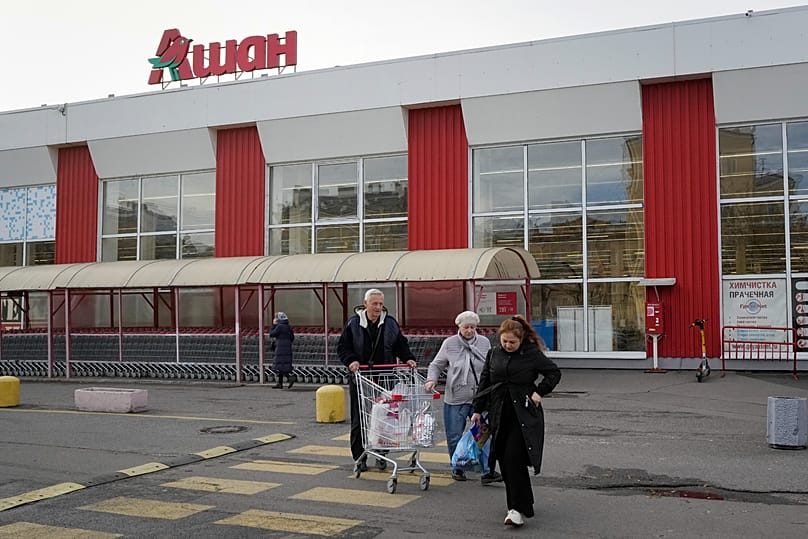
Auchan, however, has not followed suit. Selling its Russian operations in 2022 would have cut roughly 10% of its sales, or €3 billion.
The French retailer has invested hundreds of millions in Russia, with 94 hypermarkets and 138 supermarkets bearing the Auchan logo across the country.
However, as Russian shopping centres have struggled since the start of the war in Ukraine, the value of that investment has fallen sharply. This year, Auchan Russia is valued at just €179 million, according to the trade journall'Informé.
This has spurred rumours that the group may leave Russia. The newspaper La Lettre reported that negotiations were underway to sell the Russian subsidiary to Gazprombank.
However, Auchan has denied these rumours. The retailer has said that it will maintain its presence in Russia to "help feed the population."
According to La Lettre, the company rejected an offer from Gazprombank in December 2024, reaffirming its commitment to remain in the Russian market.
Food, tennis racquets, hair products
French companies still active in Russia often defend their presence as a humanitarian necessity. European sanctions or Russian countermeasures do not currently target the pharmaceutical industry and agricultural and food products.
For example, food producer Bonduelle defended its continued presence in Russia back in March 2022, arguing that its factories produced "basic foodstuffs such as corn, peas and beans" for 146 million Russian consumers, plus 90 million more in neighbouring countries, including Georgia, Armenia and Kazakhstan.
Nevertheless, the group has since significantly reduced its activity in Russia.
Of the 23 French companies that still operate in Russia, half sell non-essential consumer goods — from Clarins cosmetics and Etam lingerie to Dessange salon products and Babolat tennis racquets.
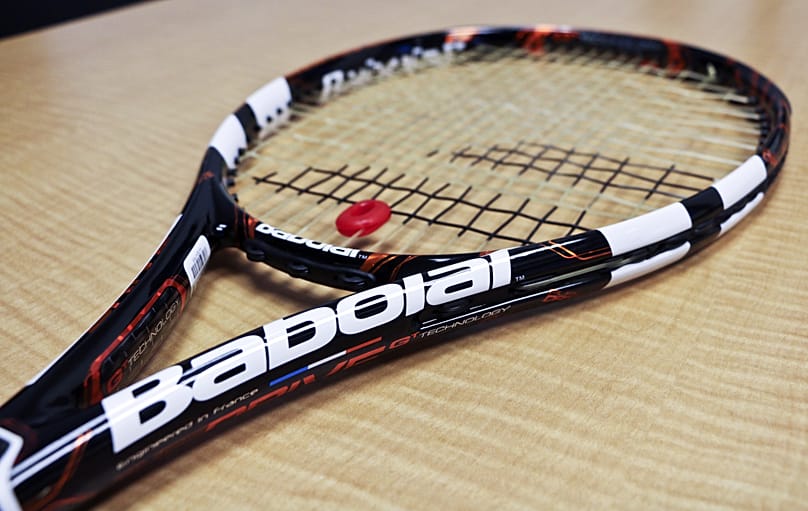
Babolat had announced that it would cease trading in Russia. However, this year it was reinstated on the list of countries still operating in the country by the Yale Chief Executive Leadership Institute.
According to the institute, this is because the Russian distributor associated with the company continues to sell racquets "with a seemingly inexhaustible flow of Babolat products that appears to far exceed normal inventories."
Altogether, foreign companies in the consumer goods sector generated €32.7 billion in revenue in Russia last year and significant tax income for the Kremlin.
Mothballing rather than withdrawing
Leaving Russia has proved far more complicated for some foreign businesses than staying.
Of the 52 French firms that have ceased operating in Russia since February 2022, only 16, such as Renault, have entirely left. For others, the cost and risk are prohibitive.
Since 2022, the Kremlin has built a complex legal and administrative system to discourage corporate exits, requiring special authorisation from a government sub-commission for any divestment.
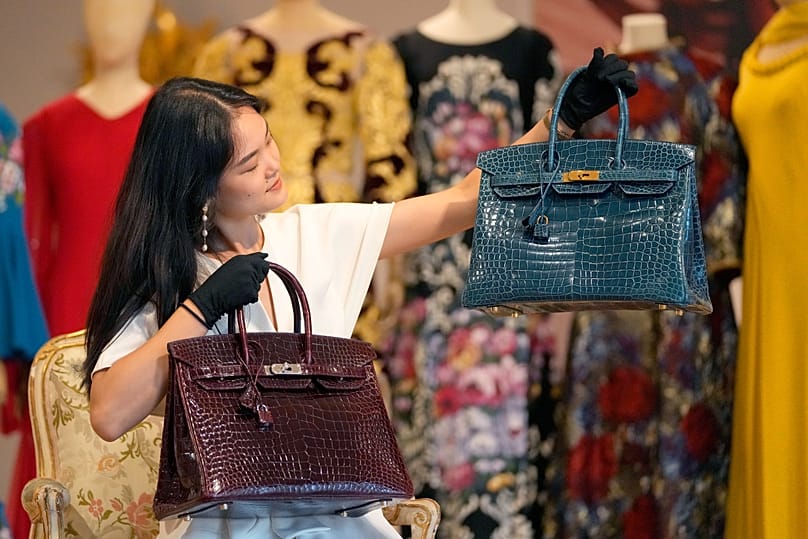
Companies that receive permission must accept a discount of at least 60% on the value of their assets and pay an exit tax — now up to 35% of the sale price.
This tax may even be interpreted as financing the war, potentially exposing firms to sanctions from their home countries.
Even companies that tried to leave before the system was introduced haven't escaped unscathed.
In August, the subsidiaries of industrial gas company Air Liquide, which had announced its withdrawal in 2022, were placed under "temporary management" by a Russian firm, following a decree signed by Putin.
Faced with these obstacles, many French companies have opted for a "mothballing" strategy or putting themselves "on standby," shutting down most operations, laying off staff, but keeping a minimal legal presence in Russia.
Firms including Kering, Decathlon and Hermès have chosen this limbo; neither active nor entirely gone.
For Nezir Sinani, director of B4Ukraine, this is not the right solution.
"Companies are supporting Russia's war economy through the taxes they pay," he told Euronews. Even when they are dormant, many companies still have a small turnover in Russia.
"The price that companies pay is much higher than the cost of leaving the country, because it is measured in hundreds of thousands of lives."







